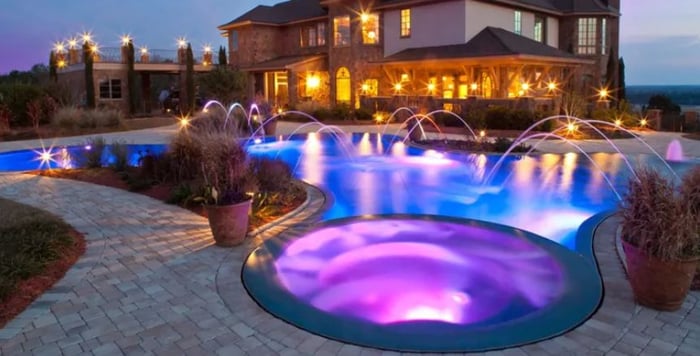It’s that time of year again; time to winterize your wardrobe, your lifestyle, AND your pool. Whether you want to heat it up so you can swim despite the chilly weather, or you simply want to keep your pool sparkling clean throughout the winter, we’ve compiled a list of tips and tricks to keep everyone—and everything—safe, healthy and in tip-top shape!
Be Sure to Balance the Water
When it comes to protecting your pool from the harsh and bitter cold weather of winter, there is nothing more important than making sure its chlorine level is correct, and you’ve got the proper information needed to keep your pool thriving. Before closing up your pool for the winter (about a week before covering it up, if you haven’t done so already), it’s important to bring the chlorine level up to 10-12pm. It’s so important to make sure it’s chlorine, alkaline, and calcium levels are balanced—that’s your greatest tool against buildup or corrosion.
Don’t Forget About the Heater
Planning on forgoing any winter swimming sessions? Then you’ll need to take care of the pump and water heater, pronto. First, start by disconnecting the filter and pump. It’s important to drain out any trapped water, as well as removing its drain plugs. Drain your heater with the same thoroughness. If you live in an area that’s prone to frequent freezing spells, think about your pool’s equipment like this: without any water trapped in your pump and/or heater, it can’t freeze. And, if it can’t freeze, you don’t have to worry about expensive damage to deal with, come spring.
Plumbing
If water gets in your skimmer and return lines and it freezes your skimmer and returns can crack, and then they will have to be replaced. Which isn't as costly with an above ground swimming pool however it can become quite expensive when dealing with an in ground pool. If you get sheets of ice in your pool do not break the ice up, ice can become quite sharp where it could act like a knife and either rip or puncture your swimming pool liner. Make sure that you disconnect the hoses from the pool to the pump and filter. Also remove the drain plugs. If water sits in the pump and filter and the temperatures freeze it can crack your pump and filter system, which would be another costly expense to replace. Plumbing pipes in hard freeze areas if not properly winterized can burst so always make sure you blow out the lines when winterizing so that there will not be any standing water in them that can freeze.
Safety Cover
One of the best ways to protect your pool and those around it is by installing a safety cover. Unlike traditional pool covers, safety covers are designed to withstand the weight of people, animals, and even cars, should they end up on top of the pool. Young children and pets often venture out on top of pool covers, mistaking them for solid ground. A safety cover would prevent an accidental drowning, should this happen to your pet or child. In addition to preventing accidental submersion and drowning, safety covers also protect your pool from debris and algae growth during the winter months. This is a great way to protect your investment, as safety covers help to keep your pool in peak condition throughout the harsh winter months. Not only will this save you a tremendous amount of time when you reopen your pool, but it will save you money as well. Safety covers last much longer than traditional pool covers and allow you to spend less when you open your pool for summer.
- For above ground pools, lock any ladders that are attached to the pool and install a safety cover. While the majority of pool related accidents happen in the spring and summer, winter accidents still arise—so keep everyone safe (especially four legged friends!) with sufficient covering and support.
- For in ground pools, make sure you have a high quality pool cover to protect your pool from debris and the possibility of frozen or near freezing temperatures. Make sure your pool cover is clean by inspecting it regularly. If you wanted added peace of mind, install a pool alarm.
Safety Fence
In addition to a safety pool cover, it is still recommended that safety fences be used in homes with small children. Even if your pool is not in use, small children could easily end up near a swimming pool in the winter months. It is best to prepared and take all necessary precautions to keep your family safe. Continue to talk to your children about pool safety and make sure they know the dangers associated with falling in the pool. Furthermore, never leave a child unattended around a swimming pool, even if it has been closed for the winter.
Lastly...
If you want to engage in winter swimming, keep your body warm. While this may sound like common sense, many ‘winter swimmers’ don’t keep their body properly covered. Make sure to wear a swimming cap, and a wetsuit if the temperature outside is particularly chilly. Ease into the water (adjusting to the temperature of the water by going up to your knees) and then work your way all of the way in.
Whether you want to keep yourself safe while swimming in your pool during the winter, or you simply want to keep your pool healthy while it’s closed down until spring, follow our guidelines for a healthy and happy pool!




